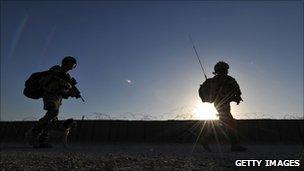Hague fury as 'Iranian arms' bound for Taliban seized
- Published

The rockets are thought to have a much greater range than current Taliban weapons
The foreign secretary has condemned Tehran's "completely unacceptable" behaviour after British Special Forces seized a shipment of suspected Iranian arms intended for the Taliban.
The 48 rockets are understood to have been intercepted in Nimruz Province, in southern Afghanistan, on 5 February.
UK officials say technical analysis showed they had come from Iran.
William Hague said Iran's actions were at odds with its claim to "support stability and security in Afghanistan".
The rockets are understood to have a much greater range than the weapons currently available to Taliban insurgents.
It is believed that both UK and Afghan troops were involved in the operation to intercept them in Nimruz, which borders Iran.
'Extremely concerned'
Mr Hague said: "This is completely unacceptable. It is not the behaviour of a responsible neighbour.
"It is at odds with Iran's claim to the international community and to its own people that it supports stability and security in Afghanistan."
The foreign secretary said technical analysis and the circumstances of the seizure left him in "no doubt" the weapons came from Iran.
"I am extremely concerned by the latest evidence that Iran continues to supply the Taliban with weaponry - weapons clearly intended to provide the Taliban with the capability to kill Afghan and Isaf [International Security Assistance Force] soldiers from significant range."
He said the British Ambassador in Tehran had raised the issue with the Iranian Ministry of Foreign Affairs.
Defence Secretary Liam Fox said: "This confirms my often repeated view of the dangers that Iran poses not only through its nuclear programme, but its continuing policy of destabilising its neighbours.
"Supplying weapons to help the Taliban kill Isaf soldiers is a clear example of the threat they pose."
Mark Sedwill, Nato senior civilian representative to Afghanistan, said all of the country's neighbours had an obligation to prevent weapons falling into insurgent hands.
"These rockets represent a step-change in the lethal impact of weaponry infiltrating Afghanistan from Iran," he added.
The UN Security Council has called on Iran to stop enriching uranium until it can be established that its intentions are peaceful. The US believes it aims to build nuclear weapons.
Mr Hague said the latest report from the International Atomic Energy Agency "provides further evidence" of why the international community should be concerned about Iran's nuclear programme.
He said: "The report comprehensively outlines the many areas where Iran is failing to comply with its international obligations.
"Iran continues to enrich uranium in defiance of numerous UN Security Council and IAEA Board Resolutions, and has consistently failed to answer questions about possible military dimensions of its programme."
And he continued: "This needs to change. Iran should not think that recent events in the Middle East have distracted the world's attention away from its nuclear programme."